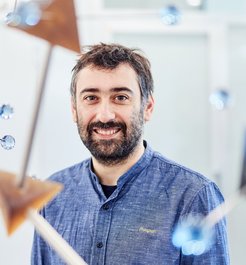Dr. Josep Cornellà receives Novartis Early Career Award in Chemistry
Prize recognizes research in the field of sustainable catalysis for organic synthesis

Dr. Josep Cornellà from the Max-Planck-Institut für Kohlenforschung has now received a particularly nice Christmas surprise: Novartis has honored him with the 2021 Novartis Early Career Award in Chemistry. The prize is given annually to outstanding scientists within the first 10 years of their independent academic research career in chemistry. The awardee receives a research grant of $100,000, which will support research in the area of "Sustainable Catalysis for Organic Synthesis" at the Max-Planck-Institut für Kohlenforschung within the next two years. "We are honored and humbled to receive this support. This grant will allow us to continue exploring unchartered areas with the aim of developing new methods to accelerate the discovery of pharmaceuticals and drugs" says Cornellà.
Novartis announced the award on LinkedIN.
About Josep Cornellà
Dr. Josep Cornellà was appointed as a Max Planck Research Group Leader at the Max-Planck-Institut für Kohlenforschung in Spring 2017. He studied Chemistry at the University of Barcelona in Spain and obtained his PhD in organic chemistry at Queen Mary University of London. In 2012, he took up postdoctoral studies at the Spanish Institute for Chemical Research (ICIQ) in Tarragona and then conducted research at the renowned Scripps Research Institute in La Jolla, California with a Beatriu de Pinós Fellowship. With his group in Mülheim an der Ruhr, he has developed novel classes of nickel and bismuth complexes that attract high interest due to their applicability in industrial processes. Earlier this year, he was awarded the most important German prize for young researchers, the Heinz Maier-Leibnitz Prize, by the Deutsche Forschungsgemeinschaft (German Research Foundation DFG) and the Federal Ministry of Education and Research (BMBF). Other highlights in Cornellà's still young research career were the Bayer Early Excellence in Science Award 2020 and a highly endowed ERC Starting Grant 2019.












